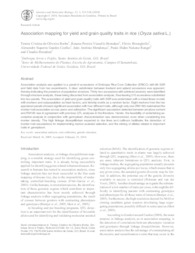Association mapping for yield and grain quality traits in rice (Oryza sativa L.).
Association mapping for yield and grain quality traits in rice (Oryza sativa L.).
Author(s): BORBA, T. C. de O.; BRONDANI, R. P. V.; BRESEGHELLO, F.; COELHO, A. S. G.; MENDONÇA, J. A.; RANGEL, P. H. N.; BRONDANI, C.
Summary: Association analysis was applied to a panel of accessions of Embrapa Rice Core Collection (ERiCC) with 86 SSR and field data from two experiments. A clear subdivision between lowland and upland accessions was apparent, thereby indicating the presence of population structure. Thirty-two accessions with admixed ancestry were identified through structure analysis, these being discarded from association analysis, thus leaving 210 accessions subdivided into two panels. The association of yield and grain-quality traits with SSR was undertaken with a mixed linear model, with markers and subpopulation as fixed factors, and kinship matrix as a random factor. Eight markers from the two appraised panels showed significant association with four different traits, although only one (RM190) maintained the marker-trait association across years and cultivation. The significant association detected between amylose content and RM190 was in agreement with previous QTL analyses in the literature. Herein, the feasibility of undertaking association analysis in conjunction with germplasm characterization was demonstrated, even when considering low marker density. The high linkage disequilibrium expected in rice lines and cultivars facilitates the detection of marker-trait associations for implementing marker assisted selection, and the mining of alleles related to important traits in germplasm.
Publication year: 2010
Types of publication: Journal article
Unit: Embrapa Rice & Beans
Observation
Some of Embrapa's publications are published as ePub files. To read them, use or download one of the following free software options to your computer or mobile device. Android: Google Play Books; IOS: iBooks; Windows and Linux: Calibre.
Access other publications
Access the Agricultural Research Database (BDPA) to consult Embrapa's full library collection and records.
Visit Embrapa Bookstore to purchase books and other publications sold by Embrapa.

